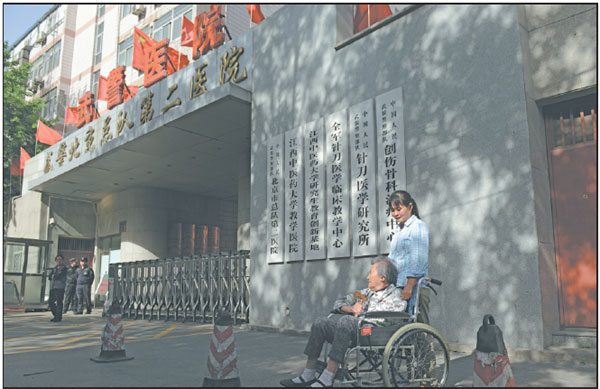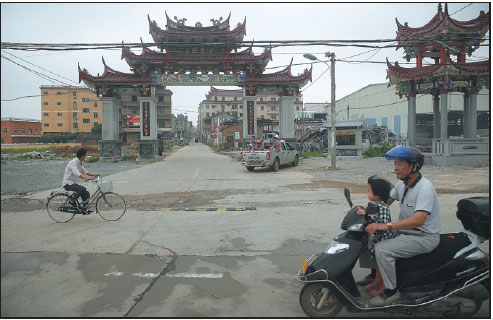|

The Baidu logo outside the company's headquarters in Beijing. Greg Baker / Agence France Presse
|
The nation's health authorities will establish a family doctor system to guarantee early response and accurate information for patients. Shan Juan reports.
The National Health and Family Planning Commission, China's top health authority, is formulating plans to establish a family doctor system to ensure a well-organized and orderly healthcare environment.
The move comes after the news that a 21-year-old computer science student with cancer died after undergoing an experimental cancer therapy that was heavily promoted by Baidu, China's leading internet search engine.
Wei Zexi, from Shaanxi province, who died on April 12, had synovial sarcoma, a rare cancer of the soft tissue. He paid 200,000 yuan ($31,000) for four courses of immunotherapy at the biomedical center of the Second Hospital of the Beijing Armed Police Corps, a military hospital that had outsourced the work to private service providers.
Although there is no suggestion that Wei's death was caused or accelerated by the treatment, it was later revealed to be an experimental process that had not be cleared for clinical use.
In a message posted online shortly before his death, Wei said he chose the hospital after seeing its name displayed prominently on Baidu when he was searching for information about his illness.
The case, which made headlines around the world, exposed Baidu's reliance on paid listings, which rank search results according to how much the advertisers have paid, and the low levels of supervision in some military hospitals.
The Cyberspace Administration of China, the online watchdog, held its own investigation and released a statement demanding that Baidu, which holds about 70 percent of China's search-engine market, restructure its listing services.
It said Baidu relied excessively on profits from paid search listings and failed to clearly identify commercial promotions, which compromised the objectivity and impartiality of its search results.
On April 5, Li Bin, the commission's director visited a primary healthcare center in Beijing as part of preparations for her top priority for the next five years - establishing a system under which every family will be registered with a general practitioner.
"It will help to establish a well-organized and orderly healthcare system to better ensure public health," Li said, during the visit.
Liu Yuanli, dean of the School of Public Health at Peking Union Medical College, said Li's visit signaled a new approach to healthcare: "A family doctor system would help prevent tragedies like Wei's in the future."
|

A patient waits at the front gate of the Second Hospital of the Beijing Armed Police Corps. The hospital made headlines around the world after the death of cancer patient Wei Zexi, who underwent experimental treatment at a clinic in its grounds. Wei Xiaohao / China Daily
|
Limited information
Few people in China are registered with general practitioners, and limited public access to information related to health and medicine means they have to resort to other methods to learn about health issues.
"So the internet, specifically the nation's search giant Baidu, has become the most-popular accessible resource," Liu said.
He said family doctors can cover most healthcare needs, such as disease prevention and sustained treatment, particularly for chronic conditions, but in an effective primary healthcare system, general practitioners can refer patients to qualified specialists if necessary.
"They can serve as the gatekeepers for primary healthcare and individual health," he said.
Du Xueping, head of the Chinese Medical Doctor Association's general practice committee, said the lack of a GP system means people swarm to large public hospitals, even for minor ailments such as common colds.
She said the authorities have acknowledged the challenges of establishing a family doctor system in China: "A link to health insurance is being considered to make sure people turn to family doctors first."
The State Council has now ordered greater efforts to increase access to family doctors and establish a GP system by improving career security for doctors and diverting more resources to the grassroots.
Liu, of Peking Union Medical College, urged the establishment of a dedicated search engine that would provide healthcare information to help people to identify misleading information and make informed choices.
He said the system would resemble NHS Choices, the official website of the National Health Service in the United Kingdom, which is free from commercial involvement.
Launched in 2007, NHS Choices is the UK's biggest medical website, accounting for about 25 percent of all health-related web traffic, such as searches for information about symptoms, illnesses and the most up-to-date treatments, according to Liu.
|

Amotorcyclist passes a traditional gate in Dongzhuang town, Putian city, Fujian province. Residents of the town are reported to have set up 80 percent of China’s private hospitals. Liuhang/ For China Daily
|
Values before profits
As Baidu was busy restructuring its results related to health and medical information, CEO Robin Li published an open letter urging employees to put values before profits.
"If we lose the support of users, we lose hold of our values, and Baidu will truly go bankrupt in just 30 days!" wrote the head of the Nasdaq-listed company.
On Sunday, Sougou, one of Baidu's biggest rivals, launched a new search product called "Wise Doctor". The company said the site is free from commercial influence, and major sources of information include the World Health Organization and the Chinese Center for Disease Control and Prevention.
Ying Jianming, deputy director of the Pathology Department at the Chinese Academy of Medical Sciences' cancer institute and hospital, said health education should be accessible through a range of channels, but especially online.
Take cancer treatment for example. Even the best treatments available can only prolong the life of a patient with terminal cancer by three to four years, but in Wei's case, the hospital claimed its treatment could result in an extra 10 to 20 years, despite his end-stage synovial sarcoma.
"That was obviously untrue," Ying said. He urged the authorities to oversee medical content in cyberspace and other media outlets to prevent fraudulent practices. On the supply side, practices should be strictly regulated according to national rules and regulations, he said.
Wei's case revealed how the military hospital allegedly ignored regulations banning commercial collaboration, provided an unapproved treatment for profit, posted false claims about its treatments and subcontracted services to private healthcare providers.
The Second Hospital of the Beijing Armed Police Corps is no stranger to publicity. Its services have been featured by the State broadcaster, China Central Television, and two years ago, Nanfang Weekend cast doubts about its credibility and immunotherapy program.
Despite the media exposure, "they were still off the government's regulatory radar and continued with business as usual," said Yang Xiaojun, a professor of administrative law at the Chinese Academy of Governance.
Hospitals affiliated with the military are more prone to irregularities because they do not fall under the jurisdiction of the public health authorities, he said. Instead, they are overseen by the health bureaus of the Central Military Commission and the National Armed Police Force. Their rules are more opaque than government regulations, which can result in management loopholes.
Now that military-affiliated medical resources are open to civilians, they should be governed by the general health authorities, led by the National Health and Family Planning Commission, Yang said.
Although that would take time, "at least it would allow the military side to improve their management and supervisory capabilities for hospitals and medical procedures."
In March, the Central Military Commission ordered the People's Liberation Army and the Armed Police Force to end all commercial activities within three years. On Saturday, the PLA and APF selected the first 17 units to be ordered to cease commercial activities, such as property rentals and the provision of medical services.
'Putian' hospitals
A number of experimental treatments have long been performed in military hospitals, according to industry insiders.
Many hospitals collaborate with businesses from Putian, a city in east Fujian province that's home to owners of private hospitals around the country that are notorious for low standards and bogus treatments.
Many are known to have paid over the odds for prominent listings on Baidu, and some analysts have said that almost 50 percent of the company's revenue was derived from "Putian" hospitals.
In April last year, the Putian (Chinese) Health Industry Association, comprising more than 8,500 private hospitals, stopped paying for Baidu's listing services to protest a hike in fees. However, they resumed payments after just a week after the number of patients fell substantially.
In theory, private hospitals are allowed to supplement the limited number of public hospitals, but the quest for profit has resulted in misconduct, scams and a rising number of complaints from patients, such as Lu Xiuhuan, a businesswoman in Quanzhou, Fujian province.
Lu visited a friend who worked as a doctor at a Putian hospital. The doctor conducted an examination and then sent some samples to the lab under her own name.
"My friend told me that if they were submitted under my name, they would definitely turn out to be abnormal," Lu said.
However, some patients said they found Putian hospitals helpful. According to a Shanghai resident who only gave her name as Mona, an examination at a Putian hospital saved her baby.
She became pregnant a year ago, but had severe pains in her abdomen, so she attended a maternity hospital in Shanghai. After an ultrasound check indicated that Mona's uterus was empty, the doctors suspected she had an ectopic pregnancy, and asked her to undergo more tests. They suggested surgery if their suspicions proved to be correct.
"However, I believed the chances were that the baby was too small to be seen because of the short gestation period. I didn't want to lose my child," the 29-year-old said.
Instead, she followed a friend's recommendation and went to a Putian hospital, where the doctors asked her to have an ultrasound check immediately.
"They stared at the screen and saw the baby in my womb. I was very grateful to them and thankful for my determination," said Mona, who later gave birth to a healthy daughter.
Public/private split
By the end of last year, China had 13,600 private hospitals, and 13,304 public ones, according to official statistics. However, public hospitals provide 80 percent of the nation's healthcare services.
Liu Guo'en, an economics professor at Peking University, said misconduct at some Putian hospitals is not indicative of standards at all private hospitals, and urged more government-backed incentives to aid the healthy development of private medicine.
"Competition is always good for improving the quality of services," he said.
At present, the best resources are usually found at public hospitals, which is why the clinic in which Wei was treated chose to cooperate with a public military hospital, he said.
"A level playing field and strict regulation and supervision are key to the sector's healthy development."
Zhang Yu in Shijiazhuang and Zhou Wenting in Shanghai contributed to this story.

By Shan Juan (China Daily)
Using WeChat? Scan QR Code or Press the Fingerprint Below ↓
--- (Or ADD WeChat ID: OKOKOKOKnet)
